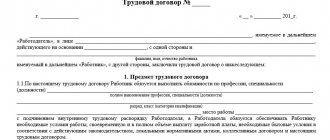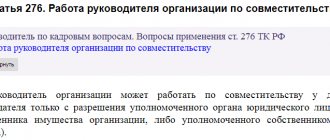From the article you will learn:
The employment contract for remote work in 2021 is concluded taking into account the changes provided for by Federal Law No. 407 of December 8, 2020, which came into force on January 1, 2021. Recently, this format of labor relations has become especially relevant. The rules regarding the procedure for regulating the work of people who work remotely were in the Labor Code of the Russian Federation even before the December amendments were introduced, but now the remote work mechanism has become more specific.
What is remote work?
By remote or remote work we mean the employee performing his labor functions outside the location of the employer, outside the stationary work location. In other words, a person works where it is convenient for him - at home, in a cafe or in a park. Communication between the employer and the hired person is carried out using the Internet, telephone or other public networks.
In general, stationary and remote workers performing similar job functions have the same rights and responsibilities. A person who works remotely is also subject to general labor guarantees. However, certain features still exist, since this implies the way of working itself.
A person can immediately be hired as a remote employee, or he can switch to remote work after working at a stationary workplace. The legislator also allows for periodic alternation between remote work and the office and forced transfer during emergencies and other unforeseen circumstances.
Note! Not every employee can switch to a remote format. This depends primarily on the specifics of the labor function. While it is quite easy to transfer an accountant or customer acquisition manager to remote work, it is simply impossible to imagine working as a car mechanic, a maid or a supermarket cashier outside of a stationary workplace.
Table No. 1. Types of remote work according to the current Labor Code of the Russian Federation.
| View | Peculiarities | Article of the Labor Code of the Russian Federation |
| Constant | The employee is employed remotely during the entire period of the employment relationship | Part 2 Art. 312.1 |
| Temporary | A person works remotely for a specific period of time, but not more than six months | Part 2 Art. 312.1 |
| Periodic | Periods of remote and stationary work alternate | Part 2 Art. 312.1 |
| Forced | Allowed in exceptional cases (natural or man-made disaster, accident, fire, flood, decision of a public authority) without the consent of the employee | Art. 312.9 |
Salary and taxes
Just like a regular employee, a remote worker’s salary depends on the minimum wage, and a regional coefficient is added on top of it. Moreover, the coefficient of the area in which he lives and works is taken, and not the one where you are located. So, if you hire an employee living, for example, in Norilsk, you will have to pay him much more.
Taxes and contributions are paid on the salary of remote workers in the same way as for regular employees. But there is an important exception: if you hire a foreigner, and he works for you without leaving his country, you do not need to pay personal income tax or fees for him, and he will work under a GPC agreement.
Main design rules
The procedure for registering for remote employment has a number of features. In any case, in order for an employee to perform a labor function remotely, a documentary basis is required. This could be:
- employment contract;
- additional agreement to the employment contract;
- local regulatory act adopted by the employer.
If an organization hires a specialist who will work outside the office, an employment contract is immediately concluded with him, providing for exactly this form of arrangement. In relation to an employee who previously worked at a stationary workplace, but then decided to transfer to a remote location, it is simply necessary to prepare an additional agreement to the existing employment contract. If the transition to remote work is carried out due to emergency circumstances, the employer must issue an appropriate order or instruction.
Important! Data on the work activities of a remote worker are entered into his work book only if the employee expresses such a desire to the employer and provides the latter with the original work book.
What additional conditions are regulated by the labor code?
In the question of whether it is necessary to clarify the place of work by indicating the structural unit, the employer makes a decision in favor of the option that is convenient for him. If the TD indicates the name of the unit, changing it will require the written approval of the subordinate under Art. 72.1 TK. If not, the change is considered a movement and does not require written consent.
- Probation. This paragraph is regulated by Art. 70 and 71 TK. The applicant can be accepted either without a probationary period or with it. Extension of the test is not permitted. The absence of this section in the employment contract means that the remote worker is immediately hired for the position.
- About non-disclosure.
- About the obligation to work for a certain period after studying, if it was paid for by the company.
- Additional insurance, non-state pension provision, improvement of the employee’s social and living conditions - if any.
- Clarification of the rights and obligations of the employee and the employer, in accordance with labor legislation, regulations describing the norms of labor law in relation to specific working conditions.
Additional conditions cannot worsen the employee’s position in comparison with the norms of labor law, collective agreements, agreements, labor regulations.
How to conclude an employment contract for remote work?
An employment contract or additional agreement providing for the performance of a labor function remotely can be concluded in a standard or electronic way. In the second case, the parties do not need to hold personal meetings; it is enough to exchange electronic documents. For such an exchange, the employer must possess an enhanced qualified signature, and the employee must possess an enhanced qualified or non-qualified signature.
All documents that a person must present when applying for a job (passport, certificate, military ID, etc.) can be sent electronically. However, the employer reserves the right to require notarized copies of these papers.
Familiarization of a newly hired employee with internal labor regulations, a collective agreement and other local acts can also be carried out through electronic exchange.
The employee has the right to request a paper copy of the employment contract or additional agreement. To do this, he must prepare a corresponding application and send it to the employer. The latter has 3 days to send the requested papers.
Note! Those remote workers who got a job for the first time independently receive documents from the Pension Fund confirming registration in the individual personalized accounting system (SNILS).
Requirements for the content of an employment contract according to the Labor Code of the Russian Federation
The list of conditions of the employment agreement with the employee is determined by Art. 57 Labor Code of the Russian Federation. It must indicate:
- place of work;
- labor function;
- work start date;
- the term of the contract, if it is fixed-term;
- terms of remuneration;
- working hours and rest hours, if they differ from those generally accepted at the enterprise
- working conditions at the workplace, etc.
A remote employee is no exception: all these conditions are necessarily fixed in the contract even when working remotely. At the same time, it is problematic to determine the place of work of a remote employee, so the wording is allowed: “The place of performance of the labor function is determined by the Employee independently.”
Labor organization and work regime
Features of the working hours of a remote worker can be provided for in:
- collective agreement;
- employment contract;
- additional agreement;
- another local act.
If all these documents do not contain instructions regarding the frequency and duration of the hired person’s performance of his tasks, the employee has the right to independently resolve this issue.
In any case, the remote worker is obliged to fully perform the duties assigned to him and work the number of working hours or shift established for him. The period of interaction with the employer is included in working hours.
In addition, management has the right to establish a clear procedure for:
- calling or leaving a remote employee to a stationary workplace;
- transmission by the employee of the results of completed tasks, reports, projects, etc.
In turn, the employer is obliged to provide the remote specialist with everything necessary for the latter to perform his duties. Printers and computers, software and even payment for using the Internet connection are all the concern of the company, not the employee. A person can use his own equipment, but then the company must pay compensation to the owner.
Note! The procedure for compensation for the use of an employee’s personal property for work purposes, as well as payment of other similar compensation, is best stated in the employment contract or additional agreement.
Differences between remote and home work
Homeworkers are people who have entered into an agreement to complete tasks from home. The main difference from remote work is that home-based workers make products from raw materials using tools and mechanisms. The terms and scope of tasks within the framework of the contract are discussed with the person. The materials are purchased by the employer or the homeworker himself, but in the latter case he is compensated in full for the money spent.
When fulfilling his obligations, the homeworker may involve members of his family. The employee’s activities are organized in accordance with legal norms. The tasks for which he joined the company should not have contraindications due to health reasons. Compliance with labor safety standards is mandatory.
A remote employee participates in the activities of the organization on an equal basis with the entire team, and he can occupy almost any position. His work is not related to the production of material assets.
Thus, the result of home work is expressed in the form of finished products, and the result of the efforts of a remote specialist is an intellectual product.
Salary, vacation and business trips
When an employee is transferred to a remote format, wages are paid as usual. The law does not allow a transfer of 0.75 or 0.5 rates only for the reason that a person works not from an office, but from home. If the company initially hires a remote worker to fill a vacant position, the terms of remuneration are discussed in the same way as with any other employee.
Leave is granted according to standard rules provided for in Chapter 19 of the Labor Code of the Russian Federation. Specialists who are registered remotely have the right to count on at least 28 days of paid rest per year worked.
To perform a specific job assignment, the employer has the right to send a remote worker to an area that is located outside the latter’s usual work location. In such circumstances, a business trip must be arranged. While a person is on a business trip for an employee:
Exchange documents with employees
When hiring an employee, entrepreneurs submit and receive mandatory documents. Remote work is no exception. Choose how it is more profitable for you to exchange documents: by mail or via the Internet.
What documents to submit when applying for a job.
On paper
Send registered letters with return receipt requested. Cost - from 80 ₽.
1. Receive copies of your passport, SNILS, diplomas and military ID from the employee. 2. Send job descriptions, orders and labor protection rules. Have the employee confirm in writing that he has read them. 3. Send the employment contract in two copies. The employee will sign them and send one copy back.
Electronic
You and the employee must have a strong, qualified electronic signature. Exchange documents through an electronic document management service, for example, Diadoc. Receiving and sending one document costs less than 10 rubles. Electronic signature for individuals - from 1000 ₽, for individual entrepreneurs and organizations - from 3000 ₽.
Complete a standard set of documents with the employee. Through the Internet this will happen instantly. The only exception is an employment contract . When you sign it electronically, send a paper version to the employee within three days. This is required by Article 312.2 of the Labor Code of the Russian Federation.
Submit reports without accounting knowledge
Elba will prepare all the necessary reports for individual entrepreneurs and LLCs. Forms will be filled out automatically, salary payments and taxes will also be generated.
Try 30 days free Gift for new entrepreneurs A year on “Premium” for individual entrepreneurs under 3 months
Dismissal
Employment relations with remote employees are terminated on the same basis as those applied to other hired persons. Such employees may resign by agreement of the parties, on their own initiative, staff reduction, or for regular failure to fulfill job duties.
However, according to Art. 312.8 of the Labor Code of the Russian Federation, there are two additional grounds for terminating an employment contract with a remote worker, namely:
- failure to communicate with the employer within two working days from the receipt of a corresponding request from management;
- inability to further perform job duties due to a change in work location.
If the employee was notified of the termination of the employment relationship electronically, the employer must send a paper copy of the dismissal order by mail to the dismissed person within 3 days.
Special conditions of an employment contract with a remote worker
Ch. 49.1 of the Labor Code of the Russian Federation defines the features of remote work that are being introduced at the enterprise:
- PVTR or collective agreement and become mandatory for the entire staff of the employee;
- an employment contract - for a specific employee.
In any case, the remote work mode requires clarification of the following points:
- the procedure for interaction between the employer and the employee: exchange of electronic documents or otherwise, deadlines for responding to requests from the immediate supervisor, method of confirming receipt of documents, etc. (Article 312.3 of the Labor Code of the Russian Federation);
- if an employee, with the consent of management, uses his property (equipment, programs) in his work, the procedure and amount of payment of compensation is stipulated (Article 312.6 of the Labor Code of the Russian Federation);
- working hours (Article 312.4 of the Labor Code of the Russian Federation), if it differs from that generally accepted in the organization;
- additional obligations of the employer to ensure safe working conditions and labor protection (Article 312.7 of the Labor Code of the Russian Federation).
What should you pay attention to?
Specialists working remotely often face a number of difficulties that may be due to the specifics of this type of work.
Sick leave
To receive sick leave, a person performing his or her work remotely must obtain a corresponding certificate from a doctor. Next, this document must be sent to the employer. You can take the original paper sick leave certificate and send it to the company by registered mail. The second option is to inform the employer of the electronic sick leave number. Further registration proceeds as usual.
Occupational Safety and Health
An employer's responsibilities for labor protection of remote workers are quite limited. The company must:
- familiarize the employee with the rules of operation of the provided equipment;
- keep records and investigate accidents that occurred during the performance of work duties by remote workers;
- comply with government regulations regarding compliance with labor rights;
- transfer contributions for injuries to the Social Insurance Fund.
Important! The employer is not obliged to fulfill any other labor protection obligations for persons employed remotely, unless otherwise provided by the collective agreement, local regulations of the organization, employment contract or additional agreement.
Part-time job
A person has the right to register for remote work and part-time work. However, in such a situation, it is necessary to take into account all the restrictions that current legislation establishes for part-time workers, in particular:
- The duration of a part-time worker’s working hours should not exceed 4 hours a day;
- vacation at an additional job is granted during the same period as vacation at the main place;
- a part-time worker may be fired in favor of a person for whom this work will become the main one.
Features of the agreement
It is clear that an employment contract with a remote accountant has its own characteristics. We list the main milestones of this document:
- the location of the employer must be indicated as the place of concluding an employment contract for remote work;
- if the employer allowed the employee to work without drawing up an employment contract, then the contract must be concluded, in particular by exchanging electronic documents with an electronic signature, no later than three working days from the date the remote employee was actually allowed to work;
- as the place of work, indicate the place where the remote employee will perform work. This can be either a home address or any other place where the work process will take place;
- indicate the period for which the employment contract is concluded. If you are drawing up a fixed-term employment contract, indicate not only its validity period, but also the reason for establishing the term (temporary absence of the main employee, performance of a predetermined job, etc.);
- if the employment contract does not specify the start date of work, then the remote employee is obliged to start work the next day after the conclusion of the contract;
- it should be indicated in the agreement between the employer and the remote employee on the registration and entry of remote work into the work book or on failure to make an entry and failure to register the work book;
- in the “Employee Rights and Responsibilities” section, you must indicate the rights and responsibilities that are provided for by labor legislation and are mandatory for all employees, as well as the labor rights and responsibilities provided for in the organization for a specific position. If the organization has developed job descriptions, then labor rights and responsibilities can not be duplicated, but a link to the relevant instructions can be made. In this case, it is necessary to familiarize the remote employee with it by exchanging electronic documents with an electronic signature;
- a remote employee has the right to use both his own equipment and equipment, software and hardware, information security tools and other means provided or recommended by the employer;
- in the accountant’s job description, indicate the list of responsibilities that you entrust to the remote accountant;
- The section “Rights and obligations of the employer” should be drawn up in accordance with Article 22 of the Labor Code. If necessary, indicate additional rights and obligations of the employer that are not directly established by law. For example, the employer’s obligation to provide the employee with voluntary medical insurance, assign additional responsibilities in the field of labor protection, etc.;
- In the “Payment and Social Guarantees” section, include a mandatory condition regarding the employee’s salary based on the remuneration system in force in the organization. Indicate the specific amount of the tariff rate or salary, additional payments, bonuses and incentive payments;
- The section “Working time and rest time” is, as a rule, not necessary to conclude an agreement with a remote employee. This section includes a condition for the provision of annual paid leave;
- A remote employee has the right to set working hours and rest hours at his own discretion, unless otherwise provided by the employment contract;
- All social guarantees apply to a remote employee, therefore a necessary condition of the employment contract is the provision of compulsory social insurance. As a rule, it is separated into a separate section, for example, “Social insurance.” When concluding an employment contract for remote work by exchanging electronic documents, an employee entering into an employment contract for the first time receives an insurance certificate of state pension insurance independently;
- in the section “Responsibility of the parties to the employment contract,” the forms of responsibility of the remote employee and the employer are prescribed. For example, financial responsibility;
- in the section “Change and termination of the employment contract” indicate the procedure for making changes to the employment contract with a remote employee and the procedure for its termination;
- in the “Final Provisions” section they indicate the procedure for resolving possible labor disputes and disagreements between the employer and employee;
- The employee confirms receipt of his copy of the employment contract on paper by exchanging electronic documents with an electronic signature;
- in the section “Addresses, details and signatures of the parties”, it is necessary to indicate the details of the employee’s identity documents (and the employer, if he is an individual), the employer’s TIN (except for individuals who are not entrepreneurs), information about the employer’s representative who signed the employment contract contract
In order not to be unfounded, we offer an employment contract with a remote accountant. A sample prepared by our specialists will help you avoid wasting time developing the required document. You can download the agreement for free using a direct link on the website.







